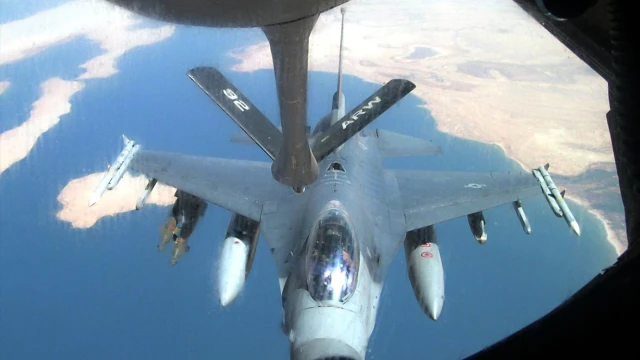Report: US military seeks to brew jet fuel from the air

The U.S. Air Force is testing new technology that could let it brew jet fuel from the air.
That’s part of an attempt to create a decentralized supply chain for jet fuel — allowing future American military outposts to produce their own.
The Department of Defense on Tuesday announced a $65 million contract with startup Air Company, which brews fuel out of carbon dioxide pulled from the atmosphere.
The company won its spot in the program by winning a 2021 competition by fueling a drone with ready-made jet fuel as part of the Air Force’s Project FIERCE.
Air Company hopes the shipping-container-sized fuel factories will supplement — or even replace — the long, tenuous and explosive supply chains that currently route the fuel from wells through refineries, ports and ultimately to bases.
“You don’t want to have to ship jet fuel around,” Air Company Chief Technology Officer Stafford Sheehan told The Hill.
Sheehan noted that fuel-related incidents — such as explosive accidents or attacks on convoys — were a principal cause of injury and death during the wars in Iraq and Afghanistan.
Future military bases, by contrast, “could produce it when they need it — and use it pretty quick,” Sheehan said.
Major air carriers like Jet Blue (an investor in Air Company) and United see such “sustainable aviation fuels” as a primary means of decarbonizing long-haul flights — a source of about 2.5 percent of global greenhouse gas emissions.
As CNBC reported, the new-model fuels represent a controversial solution — sometimes compared to the marginal health benefits of “low tar cigarettes” that the tobacco industry offers.
That’s because switching airlines to sustainable fuels — unlike, say, batteries — doesn’t remove any carbon from the atmosphere or even replace any existing emissions. Rather, it proposes to turn the global jet fuel industry into a circular closed-loop, in which carbon is captured and released into the atmosphere as the fuel is produced and used.
Even in the best case, jet fuel of any type also leads to more than its share of planetary heating because high-altitude jet emissions change the atmosphere’s composition — allowing more solar energy to break through and warm the planet.
Sustainable fuels also bring new supply chain and climate concerns. While Air Company hopes to ultimately produce its fuels from “direct air capture” — by harvested atmospheric carbon dioxide — it currently depends on waste emissions from producing biodiesel.
As Scientific American reported in December, the biodiesel industry itself and the EPA Renewable Fuel Standard that has supercharged it have probably increased global greenhouse gas emissions.
That’s because biodiesel comes from crops like corn and soy, which depend on fossil-fuel fertilizers and diesel-powered tractors and shipping to move them.
Increased production of these commodities also leads to raised emissions of nitrous oxide — a greenhouse gas 300 times as potent as carbon dioxide — and more carbon released from soil.
Nonetheless, for major air carriers under pressure from investors about their climate plans, the current options are sustainable aviation fuel or grounding their airliners until battery-electric or hydrogen fuel cell breakthroughs make truly zero-carbon air travel possible.
The military last year rolled out its own climate commitments, which included cutting greenhouse gases by 50 percent by 2030, making each base electrically self-sufficient by 2035, and making every base carbon neutral by 2050.
But for now, Air Company’s fuels generators — which can be plugged into any electric source — are more beneficial to strategic resilience than effective climate solutions.
Sheehan added that the company’s trademark Air Made fuel would fill an essential niche in the military’s energetic toolkit.
While the military has a wide range of means to generate electricity — like the Army’s tactical generator program or its research into small nuclear reactors and self-charging military vehicles — they currently “don’t have any method of turning carbon dioxide, water and that electricity into jet fuel,” Sheehan said.
Air Company hopes the Department of Defense pilot project will help it scale its operations to the point that it can offer fuels to air carriers.
Their Brooklyn-based pilot plant “produces on the order of 10s of gallons per year,” Sheehan said. “We want to produce millions of gallons to fuel entire bases.”
In its journey to this partnership, Air Company helped pay the bills by selling non-fuel products — like its Air Made vodka, distilled (like its ethanol-based fuels) from carbon dioxide and water.
The company also introduced a hand sanitizer made from captured carbon dioxide during the height of the 2020 shortages of that product.
Sheehan said these products did double-duty for the company: they helped serve as marketing, but they also helped defray costs by providing a higher-margin product Air Company could sell.
They could realize meaningful profits “with a relatively small volume when making things like [vodka or hand sanitizer], whereas when you’re making jet fuel — to get economical, you have to be an extremely large scale,” he said.
That scale is now more in reach thanks to the Democrats’ climate stimulus spending, he added.
Last summer’s Inflation Reduction Act, which provides incentives for the production of alternative fuels, will help to make them cost-competitive with fossil fuels at lower production volumes, he said.
He also highlighted the importance of innovations in renewable electricity, such as small-scale solar and wind and nuclear small modular reactors, to significantly impact the cost of sustainable aviation fuel production.





